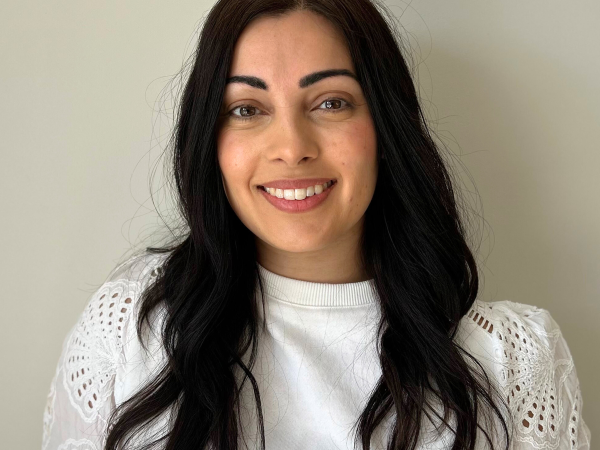
Andrea Darling
"I discovered that South Asian women commonly have low vitamin D levels, likely due to lack of exposure to sunshine and from little vitamin D in their diet. This vitamin D deficiency may impact their bone health, which in turn can severely affect quality of life."
Course
Nutrition PhDResearch project
Vitamin D and its impact on the bone health of white and South Asian women in the UK.
Why I chose Surrey
Back in 2004, I was about to start my undergraduate studies and was keen to choose a course that would give me opportunities to analyse data and set me up for a career. It was really important that any university I went to was accredited by the British Dietetic Association, which led me to the BSc (Hons) Nutrition and Dietetics course at Surrey.
When I first visited the University, I was taken aback by how friendly everybody was and how approachable the staff were; there was a clear sense of community. There were lots of green spaces, with the campus being close to the town centre and the railway station.
Throughout my undergraduate degree, I had many supportive mentors and friends within the Department of Nutritional Sciences and when it came to apply for a PhD, it was the obvious choice for me.
My research project
For my project, I investigated vitamin D deficiency and its impact on the bone health of white and South Asian women in the UK. I discovered that South Asian women commonly have low vitamin D levels, likely due to lack of exposure to sunshine and from little vitamin D in their diet. This vitamin D deficiency may impact their bone health, which in turn can severely affect quality of life. If you have good levels of vitamin D, this may help reduce respiratory tract conditions, including incidences of flu and pneumonia.
Throughout my PhD, my supervisors gave me incredible pastoral and practical support. My principal supervisor, Professor Sue Lanham-New, is still my mentor and has always been highly supportive of my career, highlighting opportunities and giving great advice.
My career and development
During my PhD, I had lots of opportunities for personal development and completed courses in emotional intelligence, time and project management, and statistics and software. My supervisors encouraged me to attend conferences in the UK, Europe and the USA. These helped develop my presentation skills and I was able to network with a wide variety of researchers within the field. I also got to help organise the inaugural Doctoral College Conference, a research and networking event for postgraduate and early-career researchers.
"My principal supervisor, Professor Sue Lanham-New, is still my mentor and has always been highly supportive of my career, highlighting opportunities and giving great advice."
My entire PhD experience has given me the essential research skills I need and most importantly the confidence to move forward with my career - I want to continue researching to help cure vitamin D deficiency. Since my studies, I’ve worked as a Postdoctoral Researcher at Imperial College London and I’m currently a Researcher at the University of Surrey, studying epidemiology and analysing NHS and UK Biobank data on vitamin D levels in South Asian people. I’ve also recently won a £30,000 grant to look at circadian rhythms (processes in the body that regulate our sleep-wake cycle every 24 hours) in bone, investigating bone formation and breakdown.
My memorable moments
There are so many great moments, but one of the most poignant was when I got my first paper published in a prestigious journal, gaining an editorial.
I also visited Buckingham Palace after the University won the Queen’s Anniversary Prize in 2017 for excellence in teaching and research in food and nutrition. And I’m incredibly proud to have won the Nutrition Society’s Julie Wallace Award 2019 for early career researchers, and to be the first nutritionist to be awarded the Royal Osteoporosis Society Young Scientist Prize in 2019.
My advice
Gain support from a good mentor, either your PhD supervisor or another researcher or academic leader, who’s well-connected in their field. They will be invaluable in opening doors for you and supporting you through the ups and downs of working in research.
Most importantly, be persistent and resilient - these qualities are vital to your success.
Discover more about our biosciences and medicine research courses, including our PhD Biosciences and Medicine course (formerly known as PhD Nutrition).

